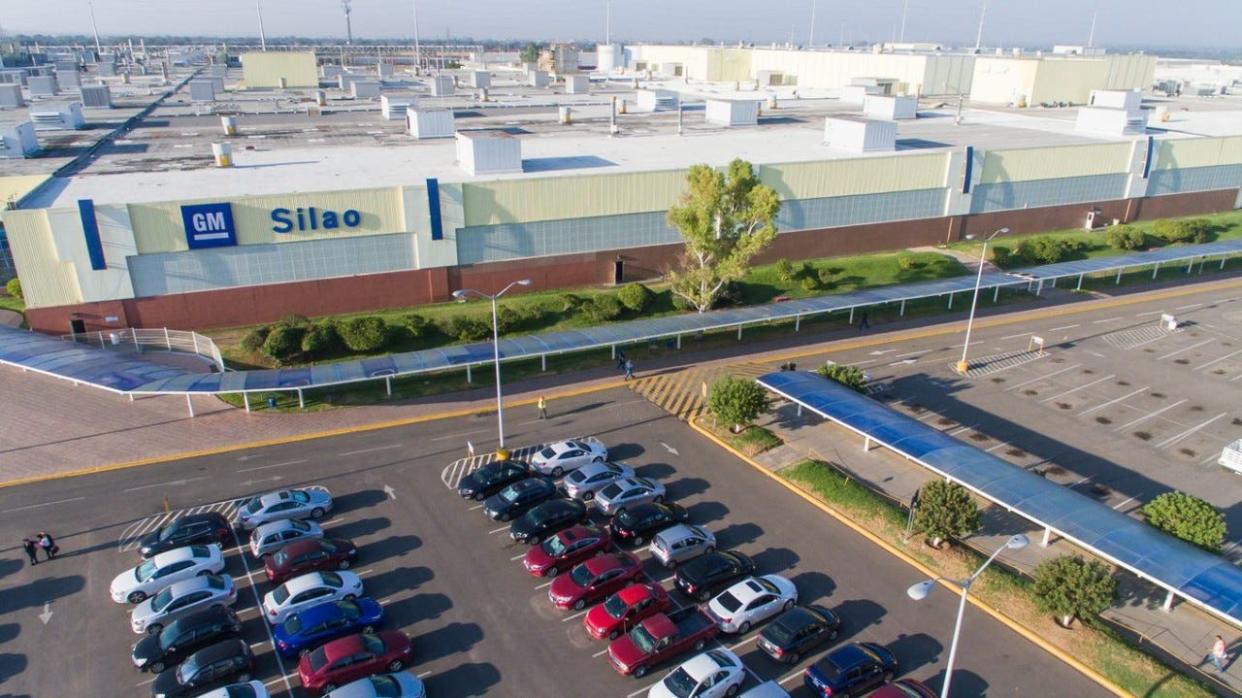UAW, AFL-CIO push GM, Mexican government to safeguard workers ahead of union vote

The UAW and AFL-CIO are calling on General Motors and the Mexico government to ensure upcoming union elections at a plant producing the profitable Chevrolet Silverado and GMC Sierra are fair and free of intimidation.
A vote at GM’s Silao plant in the central Mexican state of Guanajuato is set for Feb. 1-2. About 6,300 workers, according to GM, will be eligible to vote in an election to select which of four unions will represent the workers, although an expert on Mexican labor issues said only one of the four represents a true break from a corrupt past.
The UAW, which represents workers in the United States, said it has been closely monitoring the situation at the Silao plant.
“The UAW has a long history standing in solidarity with workers seeking independent union representation in the United States and around the world,” UAW President Ray Curry said in a news release. “This solidarity extends to our brothers and sisters in Mexico and the workers of General Motors Silao in their struggle to have a democratic and transparent union election.”
The UAW is asking specifically that labor inspectors, who can conduct investigations, be sent to the plant, that domestic and international observers be allowed to observe, that all petitioning unions receive a reliable voter list "immediately" and that the government and GM "take all necessary steps to ensure that violence inside the plant, and in the surrounding communities, does not influence the outcome of the vote."
The AFL-CIO expressed wariness about safeguards for workers.
“While we welcome the opportunity afforded by the Mexican labor law reform for workers to choose their union, we are concerned by the lack of protection for workers’ rights inside the GM plant, especially after the irregularities in the April vote, and reports of continued harassment and violence targeting independent union activists,” according to an AFL-CIO statement, referencing an earlier vote on a collective bargaining agreement.
A translated statement from GM's Mexico division cited the company's focus on the legal process:
"General Motors de México always acts in accordance with the law and is in favor of this voting process, so that employees can freely choose their union representation. For this reason, we are in collaboration with the Federal Center for Conciliation and Labor Registration, the entity in charge of coordinating and executing this vote. For GM’s part, we will be a facilitator within said process to carry out the activities that the authorities require of us, within the applicable legal framework, to guarantee that this democratic exercise is successful. All of our operations are certified by the appropriate authorities and we have not received any comments during their ordinary and extraordinary inspections on labor conditions."
GM said it has "openly communicated our position to the workers, and we emphasize that we are against any intimidation act that they may suffer during the exercise of their rights, inviting them to report — freely and anonymously — through the appropriate channels if there is any violation of the voting process."
In August, workers rejected a collective bargaining agreement under the old union as part of a reform process that allowed workers to weigh in on their union contracts. That vote followed a decision by the Mexico government to annul an earlier vote marked by what it called “serious irregularities” and which the Associated Press had reported involved union attempts to destroy ballot boxes.
The situation is a bellwether for how well the United States-Mexico-Canada Agreement, or USMCA, which replaced the North American Free Trade Agreement, will address labor concerns, according to Harley Shaiken, professor emeritus at the University of California, Berkeley, who is an expert on Mexican labor issues.
The USMCA provides a mechanism to challenge labor violations, and the U.S. trade office pursued that in May.
So far, the impact has been positive, Shaiken said. Workers were able to vote on a previous labor contract that the old union had signed, and they rejected it. Unions in Mexico have long been accused of working to protect companies rather than workers.
"You had, prior to this, a very entrenched union that had signed what has been called a protection agreement. It protects the company," Shaiken said.
But that’s not the end of the story.
“Since that defeat, the CTM (Confederation of Mexican Workers union, which had been representing the workers at the plant) has been working overtime to ensure that an independent union won’t get a foothold in this factory,” Shaiken said.
He said three of the four unions that workers will be choosing from have an affiliation with the CTM.
Union officials in Mexico did not immediately respond to a request for comment.
More: Chevy reveals electric Silverado pickup, vows to beat Ford’s towing, power, range
More: Super Bowl LVI will be GM's big chance to make splash with ads
More: Ram Heavy Duty diesel recall campaign under way, but no fix yet available
Shaiken said it will be difficult for the independent union to prevail.
“This is an all-out campaign in the factory with a lot of intimidation at play,” Shaiken said. “It will be not impossible but certainly a surprise, if the independent union is able to get over 50%” of the vote.
Wages for autoworkers in Mexico are a fraction of what they are in the United States, which, along with high productivity there, incentivizes companies to shift auto work south of the border, Shaiken said.
That has implications for employment in places like Michigan.
“What happens in Silao impacts what happens in Flint,” where GM also makes trucks, Shaiken said.
Contact Eric D. Lawrence: elawrence@freepress.com. Follow him on Twitter: @_ericdlawrence. Become a subscriber.
This article originally appeared on Detroit Free Press: UAW, AFL-CIO push GM, Mexico government on union vote
